List of Cultural Properties of Japan – paintings (Kagoshima)
Appearance
This list is of the Cultural Properties of Japan designated in the category of paintings (絵画, kaiga) for the Prefecture of Kagoshima.[1]
National Cultural Properties
[edit]As of 1 July 2019, one Important Cultural Property has been designated, being of national significance.[2][3][4]
| Property | Date | Municipality | Ownership | Comments | Image | Dimensions | Coordinates | Ref. |
|---|---|---|---|---|---|---|---|---|
| Eight Aspects of the Buddha's Parinirvana, colours on silk 絹本著色八相涅槃図 kenpon chakushoku hassō nehan zu |
Kamakura period | Minamisatsuma | Ryūgan-ji (龍巌寺) (kept at Kishinkan, Bōnotsu Center for Historical Material) |
the other seven major events in Shaka's life are depicted around the central scene[5][6] |  |
2.9 metres (9 ft 6 in) by 2.64 metres (8 ft 8 in) | 31°16′09″N 130°13′49″E / 31.269177°N 130.230276°E | [1] |
Prefectural Cultural Properties
[edit]As of 14 August 2018, six properties have been designated at a prefectural level.[4][7]
| Property | Date | Municipality | Ownership | Comments | Image | Dimensions | Coordinates | Ref. |
|---|---|---|---|---|---|---|---|---|
| Sixteen Arhats 十六羅漢 十六幅 jūroku Rakan jūroku haba |
1854 | Shibushi | Daiji-ji (大慈寺)) | on paper; sixteen scrolls; by Tokuan (徳庵) |  |
135 centimetres (4 ft 5 in) by 44.4 centimetres (1 ft 5.5 in) | 31°28′36″N 131°05′55″E / 31.476787°N 131.098566°E | [2] |
| Cedar doors 杉戸 sugi-to |
Momoyama period | Minamisatsuma | private (kept at Kishinkan, Bōnotsu Center for Historical Material) |
painted on both sides with subjects including Xiwangmu, the baku, a hawk on a rock, the morning sun, and bamboo in the snow; the right side of the face of Xi Wangmu was damaged by a machine gun bullet on 29 July 1945 |  |
178 centimetres (5 ft 10 in) by 96.5 centimetres (3 ft 2.0 in) | 31°16′09″N 130°13′49″E / 31.269177°N 130.230276°E | [3] |
| Eight Aspects of Shaka 釈迦八相之図 Shaka hassō no zu |
Edo period | Kagoshima | Kagoshima Prefecture (kept at Reimeikan, Kagoshima Prefectural Center for Historical Material) |
thirteen scrolls on silk, with gold paint; thought to be from early Ming China; restored three times since 1708; dedicated by Shimazu Yoshihisa; recorded as "Paintings of Eight Aspects of Shaka in thirteen scrolls, by a celebrated Chinese master" (「釈迦八相画十三幅, 唐人名筆」) in Sankoku meisho zue (三国名勝図会)[8] |  |
132.0 centimetres (4 ft 4.0 in) by 65.5 centimetres (2 ft 1.8 in) | 31°35′55″N 130°33′17″E / 31.598559°N 130.554646°E | [4] |
| Mount Fuji and Clouds 富嶽雲烟之図 一幅 Fugaku unen no zu ippuku |
1753 | Kagoshima | Kagoshima City (kept at the Kagoshima City Museum of Art) |
ink on paper; by Kimura Tangen (木村探元) (1679-1767)[9] |  |
237 centimetres (7 ft 9 in) by 128 centimetres (4 ft 2 in) | 31°35′45″N 130°33′12″E / 31.595818°N 130.553402°E | [5] |
| Warrior (by tradition, Shimazu Tadahisa) 武将像(伝島津忠久画像)一幅 bushō zō (den-Shimazu Tadahisa gazō) ippuku |
end of the Kamakura period/Nanboku-chō period | Kagoshima | Shoko Shuseikan (尚古集成館) | colour on silk; from Kōzan-ji[10] | 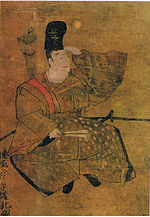 |
87.4 centimetres (2 ft 10.4 in) by 26.8 centimetres (10.6 in) | 31°37′02″N 130°34′34″E / 31.617263°N 130.576243°E | [6] |
| Unzan, colour on silk 絹本著色雲山和尚像 一幅 kenpon chakushoku Unzan oshō zō ippuku |
1490s | Izumi | Kannō-ji (感応寺) | portrait of Unzan (1274-1344), a priest from Tōfuku-ji who, at the invitation of Shimazu Sadahisa (島津貞久), oversaw the revival of the Shimazu clan family temple of Kannō-ji, where he served as chief priest from 1323-1344, garnering praise also from Ashikaga Takauji, as celebrated in the waka above his portrait, the oldest of a Zen priest in the prefecture[11] |  |
95.5 centimetres (3 ft 1.6 in) by 45 centimetres (1 ft 6 in) | 32°04′02″N 130°16′00″E / 32.067347°N 130.266786°E | [7] |
Municipal Cultural Properties
[edit]As of 14 August 2018, twenty-nine properties have been designated at a municipal level, including:[4][12]
| Property | Date | Municipality | Ownership | Comments | Image | Dimensions | Coordinates | Ref. |
|---|---|---|---|---|---|---|---|---|
| The Artist's Studio, by Kuroda Seiki 黒田清輝作「アトリエ」 Kuroda Seiki-saku atorie |
1890 | Kagoshima | Kagoshima City (kept at Kagoshima City Museum of Art) |
oil on canvas; the atelier of Raphaël Collin, Kuroda Seiki's teacher at the Académie Colarossi in Paris[13] | 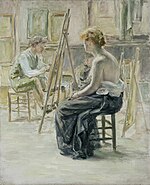 |
72.8 centimetres (28.7 in) by 60.6 centimetres (23.9 in) | 31°35′45″N 130°33′12″E / 31.595818°N 130.553402°E | for all refs see [8] |
| Six Episodes from the Eruption of Sakurajima, by Kuroda Seiki 黒田清輝作「桜島噴火連作6点」 Kuroda Seiki-saku Sakurajima funka rensaku 6-ten |
1914 | Kagoshima | Kagoshima City (kept at Kagoshima City Museum of Art) |
in Kagoshima from 8 January 1914 due to his father's illness, Kuroda Seiki witnessed a major eruption of Sakurajima and created, in oil on wooden panels, a series of six paintings showing the Plume of smoke (噴煙), Eruption (噴火), Lava (溶岩), Ash fall (降灰), Devastation (荒廃), and Steam (湯気)[14] | 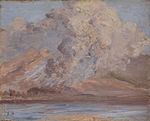 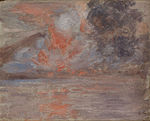    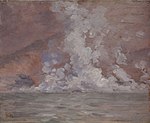 |
14 centimetres (5.5 in) by 18 centimetres (7.1 in) | 31°35′45″N 130°33′12″E / 31.595818°N 130.553402°E | |
| Bamboo, by Hatta Tomonori 八田知紀筆「竹」 Hatta Tomonori hitsu take |
C19 | Kagoshima | Kagoshima City (kept at Kagoshima City Museum of Art) |
 |
155.3 centimetres (61.1 in) by 152.5 centimetres (60.0 in) | 31°35′45″N 130°33′12″E / 31.595818°N 130.553402°E | ||
| Study of a Nude, by Fujishima Takeji 裸体習作 藤島武二 ratai shūsaku Fujishima Takeji |
1906/7 | Kagoshima | Kagoshima City (kept at Kagoshima City Museum of Art) |
oil on canvas; from Fujishima Takeji's study days in France[15] | 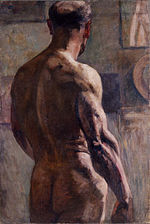 |
31°35′45″N 130°33′12″E / 31.595818°N 130.553402°E | ||
| Chinese Landscape, by Fujishima Takeji 藤島武二作「中国風景」 Fujishima Takeji-saku Chūgoku fūkei |
1938 | Kagoshima | Kagoshima City (kept at Kagoshima City Museum of Art) |
oil on canvas; Fujishima Takeji travelled to China in 1937 to serve as judge for the inaugural Manchuria Fine Arts Exhibition (満州美術展) (Manten); the following year his travels took him to Mongolia, Chengde, and Peking[16] | 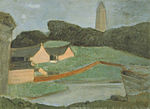 |
31°35′45″N 130°33′12″E / 31.595818°N 130.553402°E | ||
| Red Matches, by Wada Eisaku 和田英作作「赤い燐寸」 Wada Eisaku-saku akai matchi |
1914 | Kagoshima | Kagoshima City (kept at Kagoshima City Museum of Art) |
oil on canvas; entered in the eighth Bunten exhibition in 1914; Wada Eisaku's friend Shibusawa Hideo (澁沢秀雄), at the time a student at Tokyo Imperial University, served as model during a trip to Toi on the Izu Peninsula[17] | 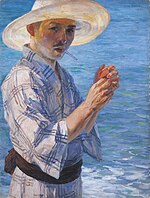 |
31°35′45″N 130°33′12″E / 31.595818°N 130.553402°E | ||
| Suzanna, by Arishima Ikuma 有島生馬作「スザンナ」 Arishima Ikuma-saku Suzanna |
1909 | Kagoshima | Kagoshima City (kept at Kagoshima City Museum of Art) |
35 centimetres (14 in) by 27 centimetres (11 in) | 31°35′45″N 130°33′12″E / 31.595818°N 130.553402°E | |||
| Parisian daughter, by Arishima Ikuma 有島生馬作「巴里娘」 Arishima Ikuma-saku Pari musume |
1964 | Kagoshima | Kagoshima City (kept at Kagoshima City Museum of Art) |
31°35′45″N 130°33′12″E / 31.595818°N 130.553402°E | ||||
| Court ladies, emakimono, by Momota Ryūei 桃田柳栄筆 「官女図巻」一巻 Momota Ryūei hitsu kannyo zu kan ichi-kan |
Edo period | Kagoshima | Kagoshima City (kept at Kagoshima City Museum of Art) |
31°35′45″N 130°33′12″E / 31.595818°N 130.553402°E |
See also
[edit]- Cultural Properties of Japan
- List of National Treasures of Japan (paintings)
- Japanese painting
- List of Cultural Properties of Japan - historical materials (Kagoshima)
- List of Historic Sites of Japan (Kagoshima)
- List of Museums in Kagoshima Prefecture
References
[edit]- ^ "Cultural Properties for Future Generations". Agency for Cultural Affairs. Retrieved 18 August 2019.
- ^ 国宝・重要文化財 [Number of National Treasures and Important Cultural Properties by Prefecture] (in Japanese). Agency for Cultural Affairs. 1 July 2019. Retrieved 18 August 2019.
- ^ "Database of National Cultural Properties: 国宝・重要文化財(美術品)(絵画 鹿児島県)" (in Japanese). Agency for Cultural Affairs. Archived from the original on 22 July 2019. Retrieved 18 August 2019.
- ^ a b c 鹿児島県内の国・県・市町村指定文化財数一覧 [Number of National, Prefectural, and Municipal Cultural Cultural Properties in Kagoshima Prefecture] (in Japanese). Kagoshima Prefecture. 14 August 2018. Retrieved 18 August 2019.
- ^ 絹本著色八相涅槃図 [Eight Aspects Nirvana Painting, colour on silk] (PDF) (in Japanese). Kagoshima Prefecture. Archived from the original (PDF) on 23 October 2013. Retrieved 21 October 2013.
- ^ "nehanzu". Japanese Architecture and Art Net Users System. Retrieved 21 October 2013.
- ^ 都道府県別指定等文化財件数(都道府県分) [Number of Prefectural Cultural Properties by Prefecture] (in Japanese). Agency for Cultural Affairs. 1 May 2019. Retrieved 18 August 2019.
- ^ 釈迦八相之図 [Eight Aspects of Shaka] (in Japanese). Kagoshima City. Retrieved 21 October 2013.
- ^ 富嶽雲烟之図 [Mount Fuji and Clouds] (in Japanese). Kagoshima City. Retrieved 21 October 2013.
- ^ 武将像(伝島津忠久画像一幅) [Warrior, by tradition Shimazu Tadahisa] (in Japanese). Kagoshima City. Retrieved 21 October 2013.
- ^ 指定文化財 [Prefectural Cultural Properties] (in Japanese). Izumi City. Archived from the original on 21 October 2013. Retrieved 21 October 2013.
- ^ 都道府県別指定等文化財件数(市町村分) [Number of Municipal Cultural Properties by Prefecture] (in Japanese). Agency for Cultural Affairs. 1 May 2019. Retrieved 18 August 2019.
- ^ アトリエ [Atelier of The Artist's Studio] (in Japanese). Kagoshima City. Retrieved 14 February 2016.
- ^ 桜島爆発図(噴火) [Explosion of Sakurajima (Eruption)] (in Japanese). Kagoshima City. Retrieved 14 February 2016.
- ^ 藤島武二「裸體習作」 [Study of a Nude, by Fujishima Takeji] (in Japanese). Kagoshima City. Retrieved 14 February 2016.
- ^ 藤島武二作「中国風景」 [Chinese Landscape, by Fujishima Takeji] (in Japanese). Kagoshima City. Retrieved 14 February 2016.
- ^ 和田英作作 「赤い燐寸」 [Red Matches, by Wada Eisaku] (in Japanese). Kagoshima City. Retrieved 14 February 2016.
External links
[edit]- (in Japanese) Cultural Properties in Kagoshima Prefecture

